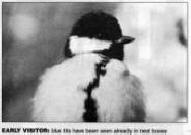
Tits making their presence felt in nest
by Paul Cormacain

HAD to go to France in mid January, to take in the Mediterranean air, to enjoy the sun, to watch the butterflies and birds. Isn't it tough what some folk have to do in the middle of winter?
The sun shone every day, and we saw butterflies every day. Not too many, just enough to bring pleasure to the visiting foreigners.
The butterflies were all red admirals, and the thinking is that they were preparing to move north. Some would get to the north west of France, others would end up at the English Channel-coast of France. From there they would take off for Ireland, Wales and England, and arrive here, so keep an eye open for red admirals.
This is an aside. I have just been checking up on the neighbour's anti-social dog in our garden. I am glad I went out, for in the far corner of the garden what did I see but a pair of great tits inspecting a nesting box. I tend to keep records about the first swallow of the year, and in the old days I checked out the first corncrake of the year.
I would also keep records of a few other happenings, like the first cuckoo, but I am sorry now that the inspection of nest boxes did not feature in my records.
A few weeks ago there were two blue tits around one of the nest boxes and I thought it just must be a coincidence. But now I think they were seriously checking up, and today's great tits were most definitely in a very serious frame of mind. They have visited the box many times. They did not go near the other box, and I would not be surprised if they became the new owners. But is it not a little early in the year?
Another small aside... We are now getting used to blackcaps staying here for the winter. Today is the first time I have seen a lady blackcap come to feed with other birds in the garden, feeding on bread, as it happens.
No sign of those French butterflies yet.
Other birds were to be seen in Nice, and Cannes, and Monte Carlo, in Menton and St Pol. Since we were on the Mediterranean, there were many Mediterranean gulls among other types. We saw some sparrows, which did not completely look like our sparrows. Having looked up many books, I can only say that they were probably our type, but with some small regional difference.
Then there was the black redstart! In the old days it was a rare migrant in England and Wales, virtually non-existent in Ireland and Scotland. Then about a century ago a black redstart nest was found in England, and after nearly a quarter of a century another one was found. Now this bird is a regular breeding bird in England, mostly near the south coast. It is still a rare visitor to Scotland and Ireland.
This type of redstart is common in France, but can be found over the Iberian Peninsula as well. Eastwards, it can be found as far away as China. There are also some birds in north Africa.
If so many local folk can visit the south of France, courtesy of the Co-Op travel group, perhaps the birds in the south of France can be persuaded to visit us. So how would it be if the butterflies travelling to visit us could bring along some black redstarts?
COMING EVENTS
Saturday, January 29: Bird Ringing at the Wildlife Trust in Crossgar, with North Down Ringing Group. Want to come along and help? Phone 028 4483 0282.
Saturday, February 5: World Wetlands Day at Lagan Meadows, more details from Wildlife Trust on 028 4483 0282.
Saturday-Sunday, February 12-13: Make a love nest for birds for St Valentine's Day, 1 pm, Castle Espie, who may be contacted on 028 9187 4146
Sunday, February 20: National Trust is organising a meal and walk at Mount Stewart, more details from 028 9751 0721
Thursday, February 24: Birdwatch Morning at Castle Espie, at 11.30am, phone number 028 9187 4146.
Monday, February 28: Lisburn RSPB will hear about Sea Bird Detective Stories from Anthony McGeehan, at 7.30pm in Friends Meeting House. Call Peter Galloway on 028 9266 1982.
Ulster Star
29/01/2005
